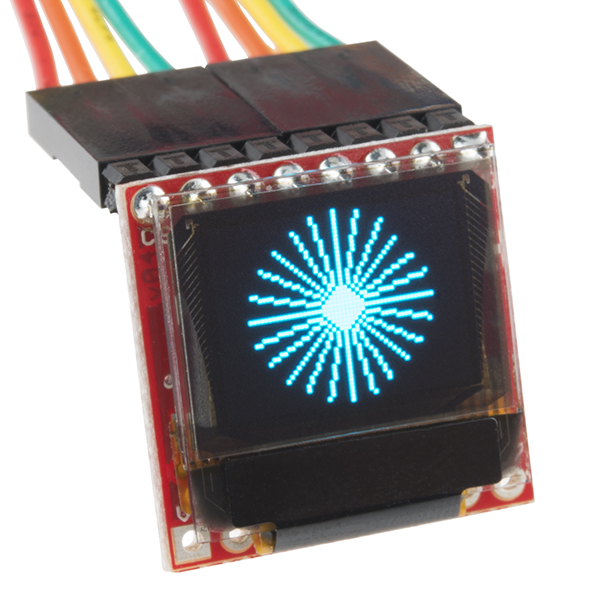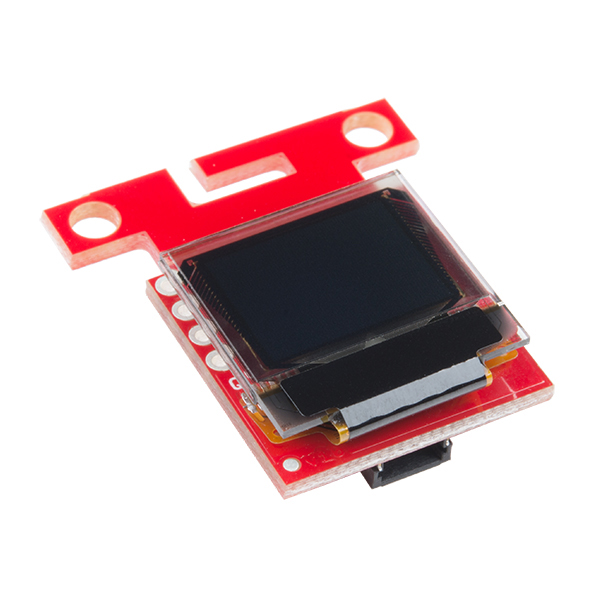SparkFun Micro OLED Arduino Library Save
Arduino library for the SparkFun Micro OLED - a breakout board for a monochrome, 0.66", 64x48 OLED display.
SparkFun Micro OLED Breakout Arduino Library
 |
 |
| SparkFun Micro OLED Breakout (LCD-13003) | SparkFun Micro OLED Breakout (Qwiic) |
An Arduino library that allows you to draw shapes and text on the Micro OLED display and Qwiic micro OLED breakout.
Repository Contents
- /examples - Example sketches for the library (.ino). Run these from the Arduino IDE.
- /src - Source files for the library (.cpp, .h).
- keywords.txt - Keywords from this library that will be highlighted in the Arduino IDE.
- library.properties - General library properties for the Arduino package manager.
Documentation
- Installing an Arduino Library Guide - Basic information on how to install an Arduino library.
- Product Repository - Main repository (including hardware files) for the Micro OLED Breakout.
- Hookup Guide - Hookup guide for the Micro OLED Breakout.
- Hookup Guide (Qwiic version) - Hookup guide for the Micro OLED Breakout (Qwiic).
Products that use this Library
- Micro OLED Breakout- A breakout for the monochrome 64x48 OLED.
- Micro OLED Breakout (Qwiic) - Qwiic version of the Micro OLED breakout with jumpers set for I2C
Contributing
If you would like to contribute to this library: please do, we truly appreciate it, but please follow these guidelines. Thanks!
MicroOLED: Version 1.3 - A New Hope
Prior to version 1.3, this library was hard-wired to the Wire I2C and SPI ports. Version 1.3
allows alternate ports to be used, in a way which is backward-compatible with the previous versions.
We have of course tested the new code, but if you do notice any compatibility issues please raise an issue.
I2C Example
Prior to v1.3, you would have used:
#define DC_JUMPER 1
MicroOLED oled(PIN_RESET, DC_JUMPER); // I2C declaration
followed by:
oled.begin(); // Initialize the OLED
From v1.3.0, you can still do it that way, or can do it like this:
MicroOLED oled(PIN_RESET); // The TwoWire I2C port is passed to .begin instead
followed by:
oled.begin(0x3D, Wire); // Initialize the OLED using address 0x3D and the Wire port
To use a non-standard address or port, you can call:
oled.begin(0x3C, Qwiic); // Initialize the OLED using address 0x3C and the Qwiic port
Please see this example for more details.
SPI Example
For SPI in v1.3, you still need to instantiate the oled using:
MicroOLED oled(PIN_RESET, PIN_DC, PIN_CS); //SPI declaration
If you want to use SPI as the SPIClass, then you can continue to call:
oled.begin(); // Initialize the OLED
To use a non-standard port, call:
oled.begin(SPI1); // Initialize the OLED using SPI1
Please see this example for more details.
Version History
- v 1.3.2 - adds support for APOLLO3 v2, allow fonts to be included/excluded individually
- v 1.3.0 - adding support for non-standard I2C and SPI ports
-
v 1.2.10 - prevent-write-outside-buffer corrections; improved I2C transfer speeds; includes the missing scroll functions;
linecorrections;enableDebugging. - v 1.2.9 - drawIcon() correction
- v 1.2.8 - Add drawIcon() and resort examples with Qwiic as default.
- v 1.2.7 - Add more comments and Wire.begin() to examples
- v 1.2.6 - Removes call of Wire.begin from library
- v 1.2.5 - Adding Qwiic Examples for I2C
- v 1.2.4 - Add colon to 7-segment font, add version history information to README, move and rename swap function to avoid namespace issues, add support for Arduino 101.
- v 1.2.3 -- Fix for I2C dcPin not configured
-
v 1.2.0 - add SAMD21 support, fix PROGMEM and
_BVerrors - v 1.1.3 (not released)
- v 1.1.2 - Added compatibility for ESP8266
- v 1.1.1 - Changed to remove register level pin access, for cross-platform compatibility
- v 1.1.0 - Matching 1.6 standard
- V 1.0.0 - Initial release
License Information
This product is open source!
Please see LICENSE.md for more information.
Distributed as-is; no warranty is given.
- Your friends at SparkFun.
